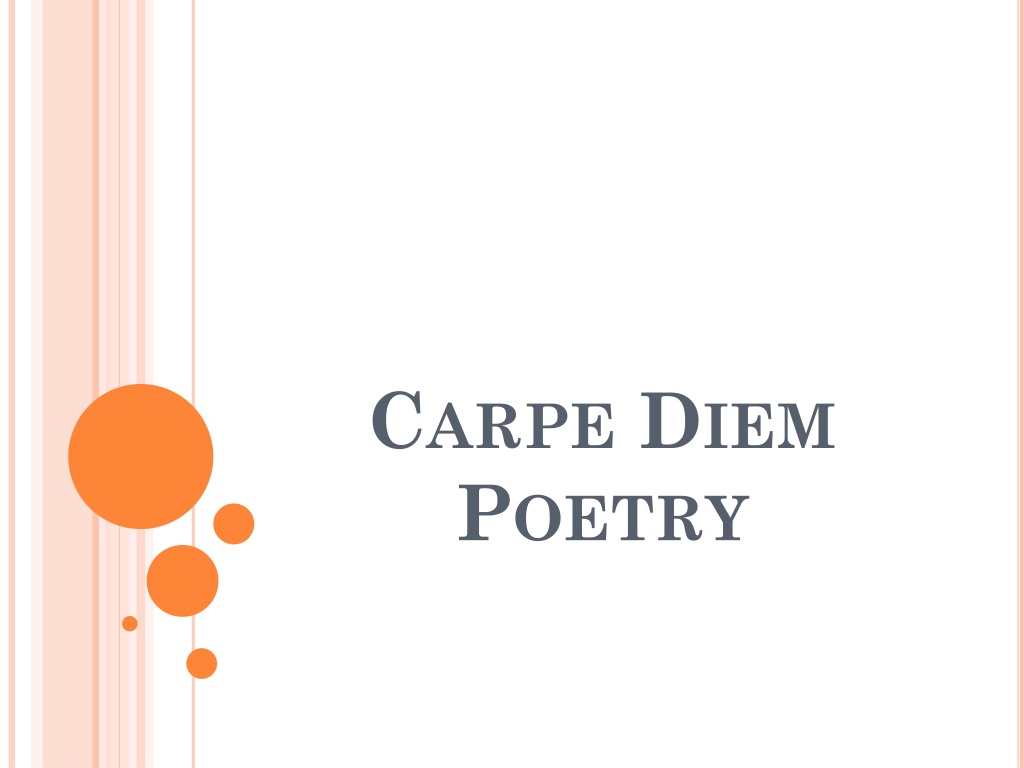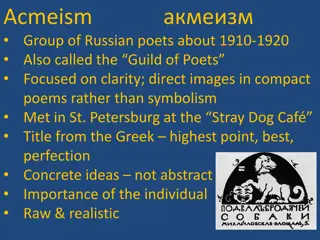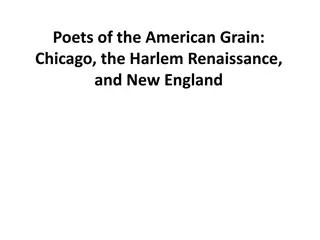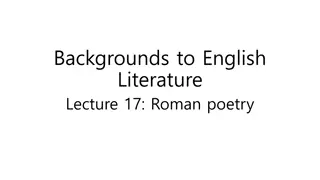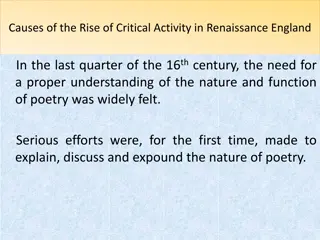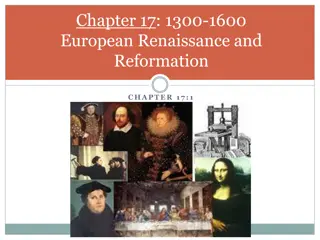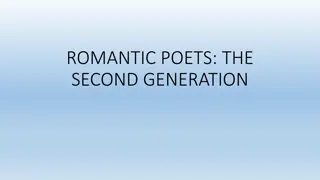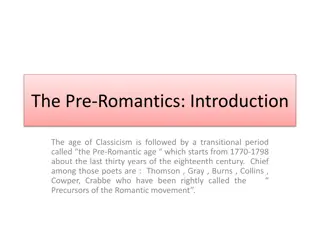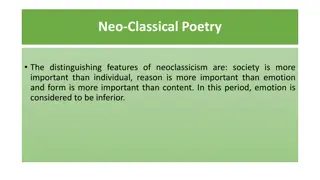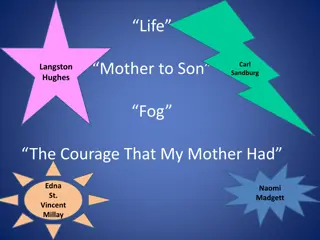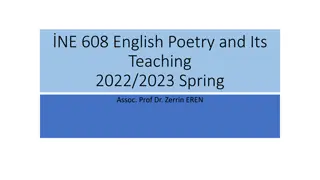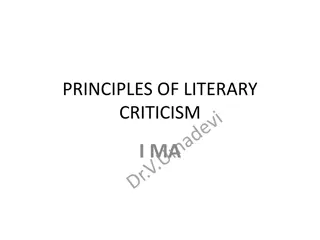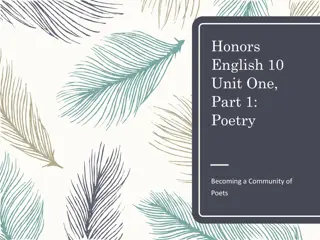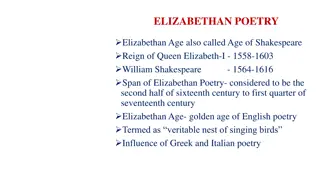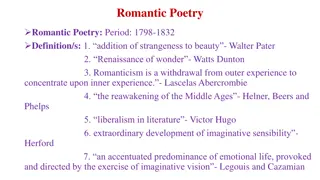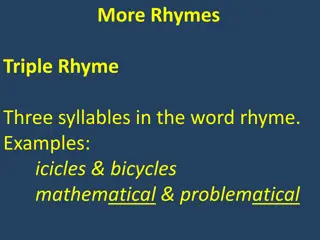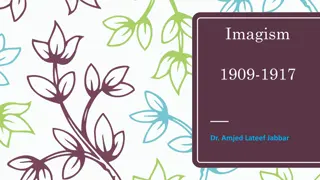Exploring Renaissance Poets and Poetry
Delve into the lives and works of prominent Renaissance poets like Christopher Marlowe, Sir Walter Raleigh, Robert Herrick, and Andrew Marvell. Learn about pastoral poetry, sonnets, Petrarchan/Italian sonnets, and the Latin phrase "Carpe Diem" meaning seize the day. Uncover the rich history and captivating tales behind these literary figures and poetic forms.
Download Presentation

Please find below an Image/Link to download the presentation.
The content on the website is provided AS IS for your information and personal use only. It may not be sold, licensed, or shared on other websites without obtaining consent from the author. Download presentation by click this link. If you encounter any issues during the download, it is possible that the publisher has removed the file from their server.
E N D
Presentation Transcript
CARPE DIEM POETRY
CARPE DIEM A Latin phrase that means seize the day
QUICK WRITE What would you do if you had twenty-four hours left to live?
PASTORAL POETRY Set in an idealized countryside inhabited by handsome shepherds and beautiful women Living in harmony with nature Longing or nostalgia for simpler, more innocent times
CHRISTOPHER MARLOWE (1564-1593) Son of a Canterbury shoemaker Won scholarships to Cambridge University A spy; helped keep track of Roman Catholics (Queen Elizabeth) Wrote plays and poems Stabbed to death in a bar fight The Tragical History of Dr. Faustus
SIR WALTER RALEIGH (1552-1618) Queen Elizabeth s confidential secretary and captain of her guard Passionately devoted to colonizing the Americas One of the first Englishmen to smoke tobacco and grow potatoes Convicted of treason during King James s reign and executed only about 35 of his poems survived
ROBERT HERRICK (1591-1674) An apprentice to his jeweler uncle Entered a university at age 22 Lived in London as a member of Ben Jonson s circle of friends Ordained a priest Died at 83
ANDREW MARVELL (1621-1678) Son of a clergyman Cambridge University Traveled abroad; worked as a tutor Served as a member of Parliament Wrote only for his friends and his personal entertainment Housekeeper sold his poems to a publisher after his death
SONNETS little sound; song 14 lines Conforms to strict patterns of rhythm and rhyme Turn Question-answer Problem-solution Theme-comment 3 types of sonnets Petrarchan/Italian Shakespearean/English Spenserian
PETRARCHAN/ITALIAN Francesco Petrarca Two parts Octave 8 line section; (abbaabba) Sestet 6 line section;(ccdeed)
SONNET 42 PETRARCH The spring returns, the spring wind softly blowing Sprinkles the grass with gleam and glitter of showers Powdering pearl and diamond, dripping with flowers, Dropping wet flowers, dancing the winters going: The swallow twitters, the gloves of midnight are glowing With nightingale music and madness; the sweet fierce powers Of love flame up through the earth; the see-soul towers And trembles; nature is filled to overflowing The spring returns, but there is no returning Of spring for me. O heart with anguish burning! She that unlocked all April in a breath Returns not And these meadows, blossoms, birds These lovely gentle girls words, empty words As bitter as the black estates of death!
SHAKESPEAREAN/ENGLISH Iambic pentameter Four parts 3 quatrains 4 lines each (abab cdcd efef) Couplet 2 lines (gg)
SONNET 18 SHAKESPEARE Shall I compare thee to a summer s day? Thou art more lovely and more temperate. Rough winds do shake the darling buds of May, And summer s lease hath all too short a date. Sometime too hot the eye of heaven shines, And often is the gold complexion dimmed; And every fair from fair sometime declines, By chance, or nature s changing course untrimmed. But thy eternal summer shall not fade, Not lose possession of that fair thou owest, Nor shall Death brag thou wander st in his shade When in eternal lines to time thou grow st. So long as men can breathe, or eyes can see, So long lives this, and this gives life to thee.
SPENSERIAN Edmund Spenser the poet s poet Iambic pentameter Four Parts 3 quatrains (abab bcbc cdcd) couplet (ee)
SONNET 30 EDMUND SPENSER My love is like to ice, and I to fire; How comes it then that this her cold so great Is not dissolved through my so hot desire, But harder grows the more I her entreat? Or how comes it that my exceeding heat Is not delayed by her heart frozen cold, But that I burn much more in boiling sweat, And feel my flames augmented manifold? What more miraculous thing may be told That fire which all thing melts, should harden ice, And ice which is congealed with senseless cold, Should kindle fire by wonderful device? Such is the power of love in gentle mind, That it can alter all the course of kind.
